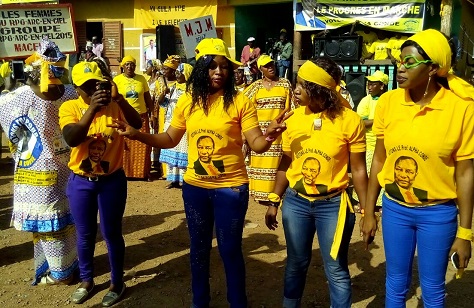
It’s not surprising, perhaps, that as the votes from Guinea’s October 11 presidential election are counted, incumbent Alpha Condé is leading with nearly 60% of the vote. ![]()
This is a country where it took six years to schedule a single set of elections for the country’s parliament.
The west African country is the first of three Ebola-stricken countries to hold an election since the epidemic ended late last year, and Condé, who won election in 2010 in the first democratic vote in Guinea’s post-independence history, was expected to fall somewhat short of a majority — forcing a runoff with his 2010 rival, Cellou Dalein Diallo, an economist and, for a brief time, prime minister under Guinea’s 24-year dictator, Lansana Conté. Only weeks before the election, Guinea marked its first Ebola-free week since the height of the crisis.
As it became clear throughout the week that the vote count will show Condé with an unassailable lead, Diallo has withdrawn from the contest following last Sunday’s election, citing fraud and a generally unfair campaign environment. Diallo’s allies had previously called for a delay in the elections, citing delays in providing voting cards to all potential voters, and Diallo himself called for a re-run in the immediate aftermath of the voting, alleging ballot stuffing and other fraudulent practices. EU observers, for what it’s worth, declared the elections sufficiently valid so as not to require a revote, even while analysts are doubting whether sub-Saharan Africa is necessarily becoming more democratic.
* * * * *
RELATED: West Africa’s Ebola crisis is as much
a crisis of governance as health
RELATED: Guinea struggles to schedule elections after opposition protests and six years of delay
* * * * *
With 11.75 million people, Guinea is a fast-growing country in west Africa, though it’s struggled since independence. The first country to break with French colonial rule, it had no democratic institutions to speak of until five years ago. Its first leader, Ahmed Sékou Touré, ruled as an autocrat for a quarter-century, and the country held its first election in 2010 following a two-year military transitional government that took power after Conté’s death.
That explains, in part, why Guinean ‘democracy’ is so imperfect — unlike Senegal or even Nigeria, it hasn’t had time to develop the kind of routinized practices or the rule of law that accompany even imperfect democratic countries. So it should come as no surprise that in leadup to this year’s election, as in 2010 and in 2013, outbreaks of violence marred the campaign, nor should it be surprising that Diallo’s supporters are crying foul. Mistrust between the two candidate’s supporters remains from the 2010 election, when Diallo won 43.7% of the vote in the first round to just 18.25% for Condé. In the runoff, Condé edged out Diallo by 52.5% to 47.5%. Then, as now, Diallo’s camp doubted the outcome, and post-election violence marred what should have been a democratic milestone for Guinea.
Voters divide largely on ethnic lines, so Condé and the Rassemblement du Peuple Guinéen (RPG, Rally for the Guinean People) rely on support from the Malinke group in the northeast, and Diallo and the Union des Forces Démocratiques de Guinée (UFDG, Union of Democratic Forces of Guinea) rely on support from the western Fula/Peul group. The coastal Susu group lent its support to Condé in 2010 and, apparently, in 2015 as well.
Despite the Ebola crisis and its handling, and one of the poorest economies in sub-Saharan Africa (with per-capita nGDP of between $550 and $615), Condé has made some progress on building infrastructure. The Chinese-structured Kaléta hydroelectric dam, for example, is expected to improved massively the power grid in the capital city of Conakry, and the country remains the continent’s largest producer of bauxite (or aluminum ore), despite the disruptions of the Ebola epidemic and the global effects of lower commodities prices.
Diallo’s campaign has emphasized the shortcomings of the electoral process and Condé’s failures, more so than providing an alternative version of governance for Guinea. While voters may not be particularly thrilled with the government’s response to the Ebola crisis, there’s no doubt that Guinea is moving gradually to higher development and stronger rule of law — leaving Diallo with little to do but wait until the 2020 election when term limits kick in for Condé.